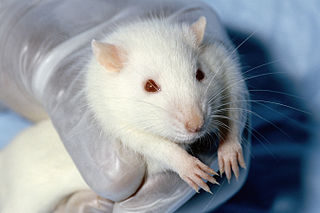
Animal welfare is the well-being of non-human animals. Formal standards of animal welfare vary between contexts, but are debated mostly by animal welfare groups, legislators, and academics. Animal welfare science uses measures such as longevity, disease, immunosuppression, behavior, physiology, and reproduction, although there is debate about which of these best indicate animal welfare.

The Eurasian lynx is one of the four extant species within the medium-sized wild cat genus Lynx. It is widely distributed from Northern, Central and Eastern Europe to Central Asia and Siberia, the Tibetan Plateau and the Himalayas. It inhabits temperate and boreal forests up to an elevation of 5,500 m (18,000 ft). Despite its wide distribution, it is threatened by habitat loss and fragmentation, poaching and depletion of prey.

A humane society is a group that aims to stop cruelty to animals. In many countries, the term is used mostly for societies for the prevention of cruelty to animals (SPCA). In the United Kingdom, and historically in the United States, such societies provide waterway rescue, prevention and recovery services, or may give awards for saving human life.

The legal aspects of ritual slaughter include the regulation of slaughterhouses, butchers, and religious personnel involved with traditional shechita (Jewish) and dhabiha (Islamic). Regulations also may extend to butchery products sold in accordance with kashrut and halal religious law. Governments regulate ritual slaughter, primarily through legislation and administrative law. In addition, compliance with oversight of ritual slaughter is monitored by governmental agencies and, on occasion, contested in litigation.

Alternatives to animal testing are the development and implementation of test methods that avoid the use of live animals.
The Universal Declaration on Animal Welfare (UDAW) is a proposed inter-governmental agreement to recognise that animals are sentient, to prevent cruelty and reduce suffering, and to promote standards on the welfare of animals such as farm animals, companion animals, animals in scientific research, draught animals, wildlife and animals in recreation.

The Eurogroup is the recognised collective term for the informal meetings of the finance ministers of the eurozone—those member states of the European Union (EU) which have adopted the euro as their official currency. The group has 20 members. It exercises political control over the currency and related aspects of the EU's monetary union such as the Stability and Growth Pact. The current President of the Eurogroup is Paschal Donohoe, the Minister for Public Expenditure, National Development Plan Delivery and Reform of Ireland.
The Organization for Respect and Care for Animals, or ORCA, is a civil society organization that helps people care for nature and animal welfare in order to achieve personal, economic and social development. The group aims to fulfill their mission in Serbia and the Western Balkans through advocacy, research, and education, as well as by monitoring policies and regulations. The purpose of ORCA's advocacy is to effect the enforcement and adoption of better policies and to improve society's attitude towards nature and animals.

Dyeing is the craft of imparting colors to textiles in loose fiber, yarn, cloth or garment form by treatment with a dye. Archaeologists have found evidence of textile dyeing with natural dyes dating back to the Neolithic period. In China, dyeing with plants, barks and insects has been traced back more than 5,000 years. Natural insect dyes such as Tyrian purple and kermes and plant-based dyes such as woad, indigo and madder were important elements of the economies of Asia and Europe until the discovery of man-made synthetic dyes in the mid-19th century. Synthetic dyes quickly superseded natural dyes for the large-scale commercial textile production enabled by the industrial revolution, but natural dyes remained in use by traditional cultures around the world.
Animal welfare science is the scientific study of the welfare of animals as pets, in zoos, laboratories, on farms and in the wild. Although animal welfare has been of great concern for many thousands of years in religion and culture, the investigation of animal welfare using rigorous scientific methods is a relatively recent development. The world's first Professor of Animal Welfare Science, Donald Broom, was appointed by Cambridge University (UK) in 1986.
Philip John Lymbery is the Global CEO of farm animal welfare charity, Compassion in World Farming International, Visiting Professor at the University of Winchester’s Centre for Animal Welfare, President of Eurogroup for Animals, Brussels, founding Board member of the World Federation for Animals and a Leadership Fellow at St George's House, Windsor Castle.

Major-General Peter Ronald Davies is a retired British Army Officer and animal welfare campaigner.

COPA-COGECA, is the union of the two big agricultural umbrella organisations COPA and COGECA and the strongest interest group for European farmers. Founded in 1962 and headquartered in Brussels, its activity focus is on the Common Agricultural Policy and other policy areas relevant to farmers and agri-cooperatives, such as: food safety, animal health and welfare, plant health, environment, research and innovation, trade etc..
Animal rights vary greatly among countries and territories. Such laws range from the legal recognition of non-human animal sentience to the absolute lack of any anti-cruelty laws, with no regard for animal welfare.

The European Convention for the Protection of Animals kept for Farming Purposes, also known as the Farm Animal Convention, is an animal welfare treaty of the Council of Europe, adopted on 10 March 1976 in Strasbourg, and effective since 10 September 1978.










